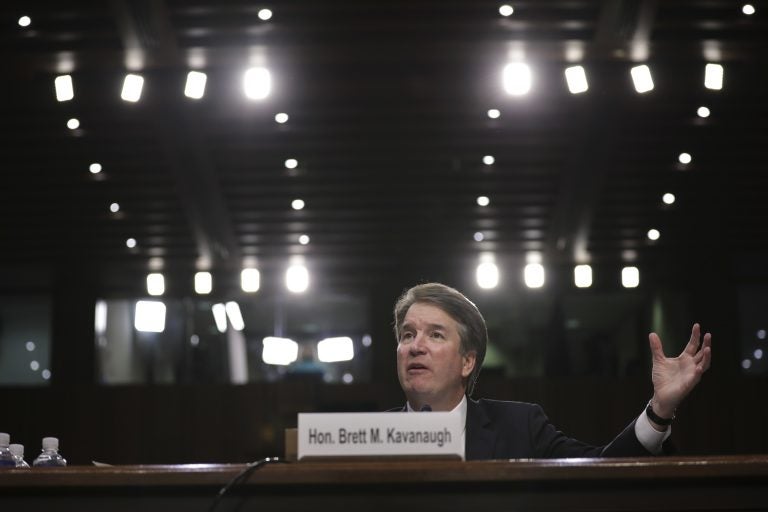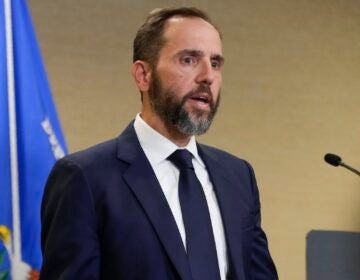The process is a lie — and that’s the truth
The confirmation process has become a ridiculous pantomime, where nominees proclaim their generic 'philosophy' without telling you what they think about specifics.

Supreme Court nominee Brett Kavanaugh testifies before the Senate Judiciary Committee last month. (Drew Angerer/Getty Images)
I believe Christine Blasey Ford. In her testimony to the Senate Judiciary Committee Thursday, she was poised, direct, and polite in recounting an assault by Brett Kavanaugh when they were teenagers. That stood in sharp contrast to the rudeness and belligerence of Kavanaugh, who was advanced to the full Senate by an 11-10 committee vote on Friday. Under pressure from some key Republican senators, President Trump ordered the FBI to investigate Ford’s claims.
But I also believed Kavanaugh, when he said that Democrats had seized upon these charges in a last-ditch effort to derail his bid for the Supreme Court.
“There has been a frenzy to come up with something, anything … that will block a vote on my nomination,” Kavanaugh declared.
And that’s because the confirmation process has become a ridiculous pantomime, where nominees proclaim their generic “philosophy” without telling you what they think about specifics.
Kavanaugh was a model candidate in that regard, managing to duck every important question about the key judicial issues of our day. There’s no question that his evasiveness encouraged Democrats to pounce on allegations of sexual misconduct against him.
What else could they go on, really? In the dull, endless hours of hearings that preceded Christine Ford’s accusations, Kavanaugh refused to tell the committee whether he agreed with the Supreme Court’s 2015 decision affirming the right to same-sex marriage. He refused to say if he believed Congress or the president could bar people from entering the United States on the basis of race.
And, of course, he refused to provide his view of Roe v. Wade, other than saying that the 1973 abortion ruling was “settled law”— which says nothing at all about whether he would unsettle it.
Here Kavanaugh echoed President Donald Trump’s prior Supreme Court nominee, Neil Gorsuch, who sailed through his own confirmation hearings by evading questions about presidential power, voting rights, and environmental regulation.
“If I were to start telling you which are my favorite precedents or which are my least favorite … I would be tipping my hand and suggesting to litigants I already made up my mind about their cases,” Gorsuch solemnly intoned.
Please. Gorsuch and Kavanaugh were nominated precisely because they have made up their minds, about abortion and much else. That’s why the president put them on his list of approved Supreme Court candidates during his campaign for the White House, when Trump said he would only appoint judges who want to overturn Roe v. Wade. And it’s also why the GOP has rallied around Brett Kavanaugh in his — and their — hour of need, all the while pretending that they don’t know how he’d rule if he’s confirmed.
Defending Kavanaugh’s silence on abortion, his Republican advocates dutifully trotted out Ruth Bader Ginsburg’s comment at her own 1993 confirmation hearing: “A judge should not make public comments on the merits of a matter pending or impending in any court.”
But they neglected to note that Ginsburg also added a full-throated defense of Roe, which was not — and is not — a matter before the Supreme Court.
To repeat, I believe Christine Blasey Ford. And I also believe that Brett Kavanaugh was less than truthful about his encounter with Ford, just as Clarence Thomas almost surely lied about his harassment of Anita Hill.
Subsequent investigations found that Thomas had made comments to other women exactly like the ones Hill described — including the notorious remark about a pubic hair in his Coke — and it’s simply impossible to imagine how Hill could have made up the same thing.
Likewise, there’s no good reason to think that Ford invented her story of assault at the hands of Kavanaugh. Now that the FBI will investigate the episode, we may soon discover that Kavanaugh lied about it.
But the whole Supreme Court confirmation process is a lie, too. You can’t nominate people for the court because of their beliefs, then allow them to remain silent about what they believe.
And, until that changes, you can expect long rounds of attacks on the background and character of every candidate for the court. Some of these charges — including the ones against Kavanaugh — will be fair and honest; others won’t be.
But, if our future judges aren’t required to tell us what they truly think, we’ll have no choice but to go for the jugular. And that might the saddest truth of all.
Jonathan Zimmerman teaches education and history at the University of Pennsylvania. He is the author (with Emily Robertson) of “The Case for Contention: Teaching Controversial Issues in American Schools” (University of Chicago Press).
WHYY is your source for fact-based, in-depth journalism and information. As a nonprofit organization, we rely on financial support from readers like you. Please give today.




